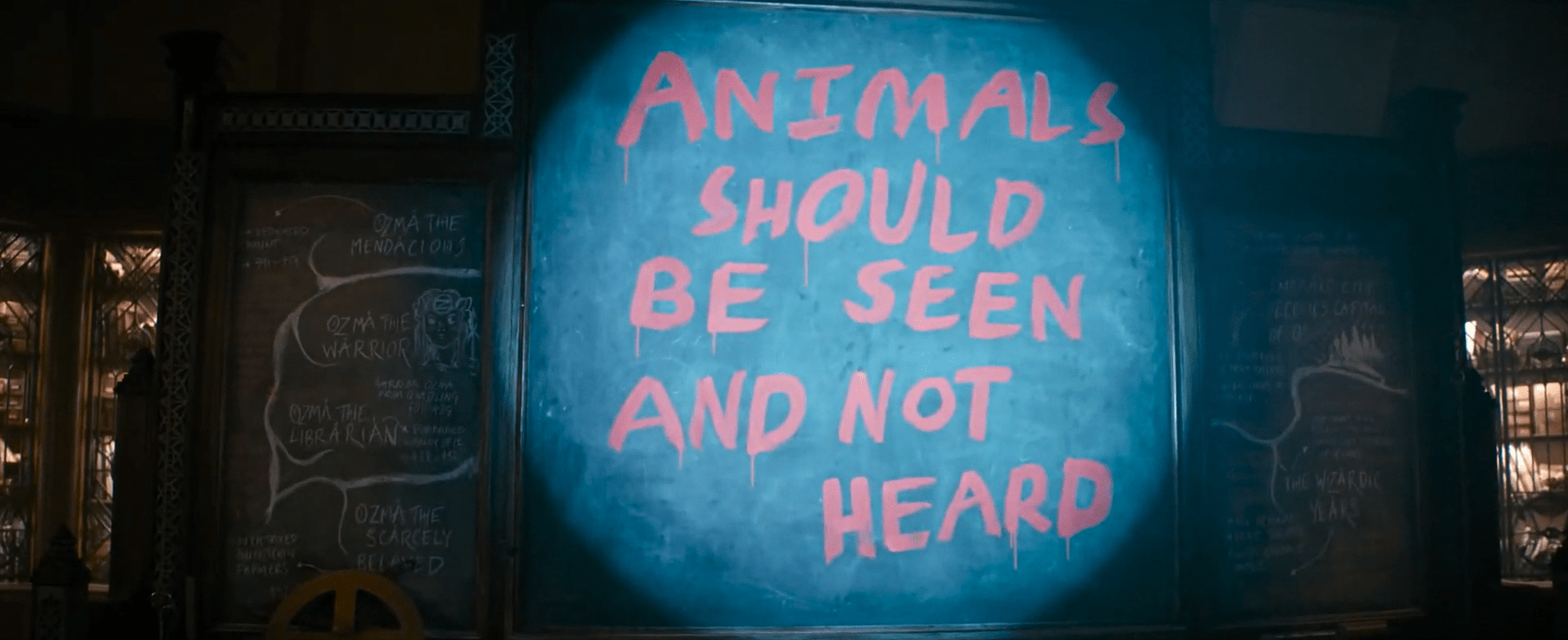“Are we all just going to sit here and do nothing?”
I didn’t expect to fall in love with Wicked over the holidays. After the letdown that was Barbie (sorry not sorry), I assumed a big-budget Blockbuster adaptation of the 2003 Broadway musical would have a lot of spectacle and little, if any, substance.
I grovel in eternal contrition.
Beyond the exceptional performances from the cast, the mesmerizing score, enchanting costumes and set design, and brilliant choreography, I was struck by how Wicked’s story captures the zeitgeist of today’s socio-political landscape, particularly its reflections on “otherness.”
I’m sure I’m not the first one to observe the parallels between Wicked’s scapegoating campaign against Animals and the real-life systemic persecution of marginalized groups — the Holocaust, McCarthyism, and the Jim Crow Laws to name only a few. But I do think there’s something else the film alludes to, something especially salient to our current cultural climate, that addresses the fear and hatred of otherness: binary thinking.
According to the Oxford Review, binary thinking is “the tendency to view things in strict black-and-white terms, often ignoring the nuances and complexities that exist within any given situation.” Examples include good vs. evil; queer vs. straight; right vs. left; man vs. woman. Binary thinking pits conflicting perspectives against each other without leaving space for thought, forcing you to choose a side. Upon examining these binaries, you might notice one other insidious aspect lurking beneath this dualist worldview — it’s not only limiting, but profoundly dehumanizing.
Consider Elphaba (Cynthia Erivo) aka the “Wicked” Witch of the West, who is immediately discriminated against everywhere she goes simply because she has green skin. She’s not a murderer, she doesn’t scream profanities at innocent passersby, and she doesn’t kick puppies for fun. She’s just … different. And yet, when she arrives at Shiz University, all the students — including the other main character, Galinda (Ariana Grande-Butera) — turn against her. Galinda, the popular girl, dislikes Elphaba because of their perceived differences and single handedly dubs Elphaba an outcast. However, the film places the viewer in Elphaba’s perspective, allowing the viewer to experience the unjust ostracization she faces, which illustrates a key feature of binary thinking — it only works if you have no skin in the game. As soon as you become the Other, your perspective shifts.
Near the end of the film, the Wizard (Jeff Goldblum) declares that the best way to unite people is to give them a common enemy. I would take this one step further: the best way to ‘control’ people is to distract them with fictitious adversaries. For Hitler it was the Jews; for McCarthy it was communists, queer folks, and anyone who didn’t toe the party line. In the West, the most recent target of rampant xenophobia has landed on immigrants, a term so selectively used that it has become nearly meaningless.That anti-immigration rhetoric is being pushed by colonial powers like the United States and Canada — both of which decimated entire populations to establish their statehood and sovereignty on Indigenous lands only to settle these so-called nations with, well, immigrants — is painfully ironic.
Why do we think this way? Why do we resort to an us vs. them mentality? In short, because it’s easier.
As Peter Lurie puts it, “After thousands of years of a binary approach to political, philosophical, economic and sociological problems, we have let our imagination ossify.” Galinda could have taken the time to get to know Elphaba before passing judgement, just like the citizens of Oz could have questioned the words of the Wizard instead of assuming Elphaba was wicked. But questioning the status quo is tiresome, not to mention dangerous. It’s easier to label people and sequester them into homogeneous groups, stripping them of their identity rather than seeing them as individuals. As humans.
Binary thinking is a choice, and Wicked highlights the power of choice in the poignant scene at the Ozdust ballroom. Elphaba enters the club wearing her iconic pointy black hat — a “gift” from Galinda who knows the hat will earn Elphaba nothing but ridicule. But Elphaba, alone on the dance floor, the object of derision, starts to dance by herself. It’s slow and strange, an interpretative improvisation that everyone laughs at. But in this moment, Galinda is ridden with guilt. She knows she is responsible for much of Elphaba’s pain, and she finally realizes that she has the power to change the narrative. To everyone’s surprise, Galinda joins Elphaba in her dance and, slowly but surely, everyone else joins in too. Galinda may act out of guilt, but she does act. It’s a powerful scene, one that beautifully showcases how the actions of one person can have enormous impact.
Those in power prefer that we see each other as enemies, categorizing and separating ourselves instead of holding space for one another and seeking new paths of understanding. The Wizard deduces what Elphaba realizes far too late: he has no real power. His authority hinges on our division, our willingness to believe the projected illusion. But we don’t have to play along. By questioning who benefits from this binary thinking, we can break free and progress toward something better together. All we have to do is look behind the curtain.


